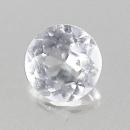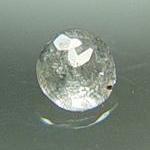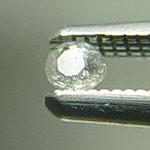|
ClassicGems.net |
|
|
 |
|
Analcime |
|
|
Discovered in 1801; IMA status: Valid (pre-IMA; Grandfathered) |
|||
|
|
|
Chemistry |
|
|
|
|
|
NaAl(Si2O6)·(H2O) |
|
|
|
Hydrated Sodium Aluminum Silicate |
|
Molecular Weight: |
220.15 gm |
|
Composition: |
Sodium |
10.44 % |
Na |
14.08 % |
Na2O |
|
|
Aluminum |
12.26 % |
Al |
23.16 % |
Al2O3 |
|
|
Silicon |
25.51 % |
Si |
54.58 % |
SiO2 |
|
|
Hydrogen |
0.92 % |
H |
8.18 % |
H2O |
|
|
Oxygen |
50.87 % |
O |
|
|
|
|
|
100.00 % |
|
100.00 % |
= TOTAL OXIDE |
|
|
|
||||
|
Classification |
|
|
|
|
|
Silicates (Germanates) |
|
|
8/J.27-10 |
|
|
|
9 : SILICATES (Germanates)
|
|
Related to: |
Zeolite Group. Analcime-Pollucite Series and the Analcime-Wairakite Series. The sodium analogue of Pollucite. |
|
Members of Group: |
Zeolite Group: Alflarsenite, Amicite, Ammonioleucite, Analcime, Barrerite, Beaumontite (of Lévy), Bellbergite, Bikitaite, Boggsite, Brewsterite, Chabazite, Chabazite-Lévyne Subgroup, Chiavennite, Clinoptilolite, Cowlesite, Dachiardite, Direnzoite, Edingtonite, Epistilbite, Erionite, Faujasite Subgroup, Ferrierite, Ferrochiavennite, Flörkeite, Garronite, Gaultite, Gismondine, Gmelinite, Gobbinsite, Gonnardite, Goosecreekite, Gottardite, Harmotome, Heulandite, Hsianghualite, Kirchhoffite, Laumontite, Leucite, Lévyne, Lovdarite, Maricopaite, Mazzite, Merlinoite, Montesommaite, Mordenite, Mutinaite, Nabesite, Natrolite, Offretite, Pahasapaite, Paranatrolite, Parthéite, Paulingite, Perlialite, Phillipsite, Pollucite, Roggianite, Scolecite, Stellerite, Stilbite, Strontiohurlbutite, Terranovaite, Thomsonite, Tschernichite, Tschörtnerite, Wairakite, Weinebeneite, Wenkite, Willhendersonite, Yugawaralite |
|
Varieties: |
Cesian Analcime, Germanate-Analcime |
|
Synonyms: |
Analcidite, Analcine, Analcite, Cubicite, Cubizite, Cuboite, Eudnophite, Euthalite, Euthallite, Five Islands Garnet |
|
|
|
|
Crystal Data |
|
|
|
|
|
Commonly euhedral, pseudocubic crystals, to 9 cm, typically showing fine twin striae. As disseminated grains; rarely granular, massive. |
|
|
Common and repeated on [110], [101], and other orientations, from two complex displacive phase transformations during cooling |
|
|
|
|
|
Physical Properties |
|
|
|
|
|
Very poor on {100}; Indistinct |
|
|
Conchoidal |
|
|
Brittle |
|
|
5.0 - 5.5 |
|
|
2.24 - 2.29 (g/cm3) |
|
|
Fluorescent; green blue white under SW UV,green, creamy white yellow under LW UV |
|
|
Not Radioactive |
|
|
Other: |
Weakly Piezoelectric, weakly electrostatic when rubbed or heated. |
|
|
|
|
Optical Properties |
|
|
|
|
|
Colorless, White, Gray, Yellowish, Pink, Greenish |
|
|
Transparent to Translucent |
|
|
Vitreous |
|
|
1.479 - 1.493 Isotropic; anomalously biaxial ( + ) |
|
|
0.0010 |
|
|
Weak |
|
|
None |
|
|
|
|
|
Occurances |
|
|
|
|
|
Geological Setting: |
In the groundmass or vesicles of silica-poor intermediate and ma¯c igneous rocks, typically basalts and phonolites, from late-stage hydrothermal solutions, or disseminated due to deuteric alteration. In lake beds, altered from pyroclastics or clays, or as a primary precipitate; authigenic in sandstones and siltstones. |
|
Common Associations: |
Zeolites, Prehnite, Calcite, Quartz, Glauconite |
|
Common Impurities: |
None |
|
Type Locality: |
Cyclopean Islands, Aci Trezza (Acitrezza), Etna Volcanic Complex, Catania Province, Sicily, Italy |
|
Year Discovered: |
1801 |
|
View mineral photos: |
|
|
|
|
|
Unusual Gem Categories |
|
|
|
|
|
|
|
|
|
|
|
More Information |
|
|
|
|
|
|
|
|
|
|
|
Analcime is a member of the Zeolite Group of minerals that is comprised of over 40 minerals including these gem-type minerals: Analcime, Barrerite, Chabazite, Epistilbite, Gmelinite-Na, Goosecreekite, Mordenite, Natrolite, Pollucite, Scolecite, Stellerite, Stilbite, Thomsonite and Yugawaralite. The mineral is not rare, but gem grade crystals are seldom found and are always small. Crystals are usually opaque to slightly translucent and found as colorless, white, gray, yellowish, pink and greenish. Large crystals from Mt. Ste. Hilaire, Quebec, Canada have been found that are mostly opaque white but with small facetable areas. Analcime is one of the unusual minerals that exhibit the piezoelectric effect. Analcime is weakly piezoelectric. Piezoelectricity is the ability of some mineral crystals to generate a voltage in response to applied mechanical stress such as an external pressure. Piezoelectricity was discovered in 1880 by French physicists, brothers Jacques and Pierre Curie. Analcime is named from the Greek word analkis for weak, alluding to the weak electrostatic charge developed when rubbed or heated. Some localities for outstanding specimens: in Italy, at Aci Castello, Cyclopean Islands, and from Val di Fassa and Alpe di Siusi, Trentino-Alto Aldige. Large crystals from Kotchechovmo, Krasnoyarski Territory, Russia. At Breidhdalsheidhi, Iceland. In the Dean quarry, St. Keverne, Lizard Peninsula, Cornwall, England. Around Glasgow, Dumbartonshire, Scotland. In the USA, from the Lake Superior district, Houghton County, Michigan; at Cornwall, Lebanon County, Pennsylvania; from Bergen Hill, Hudson County, and West Paterson, Passaic County, New Jersey; on Table Mountain, Jefferson County, Colorado; in the Price Creek quarry, Benton County, Oregon. From the Bay of Fundy district, Nova Scotia; large crystals from Mont Saint-Hilaire, Quebec, Canada. From Flinders, Victoria, Australia. |
|
|
Analcime gems for sale:
|
|||||||||||||||||||||||||||

